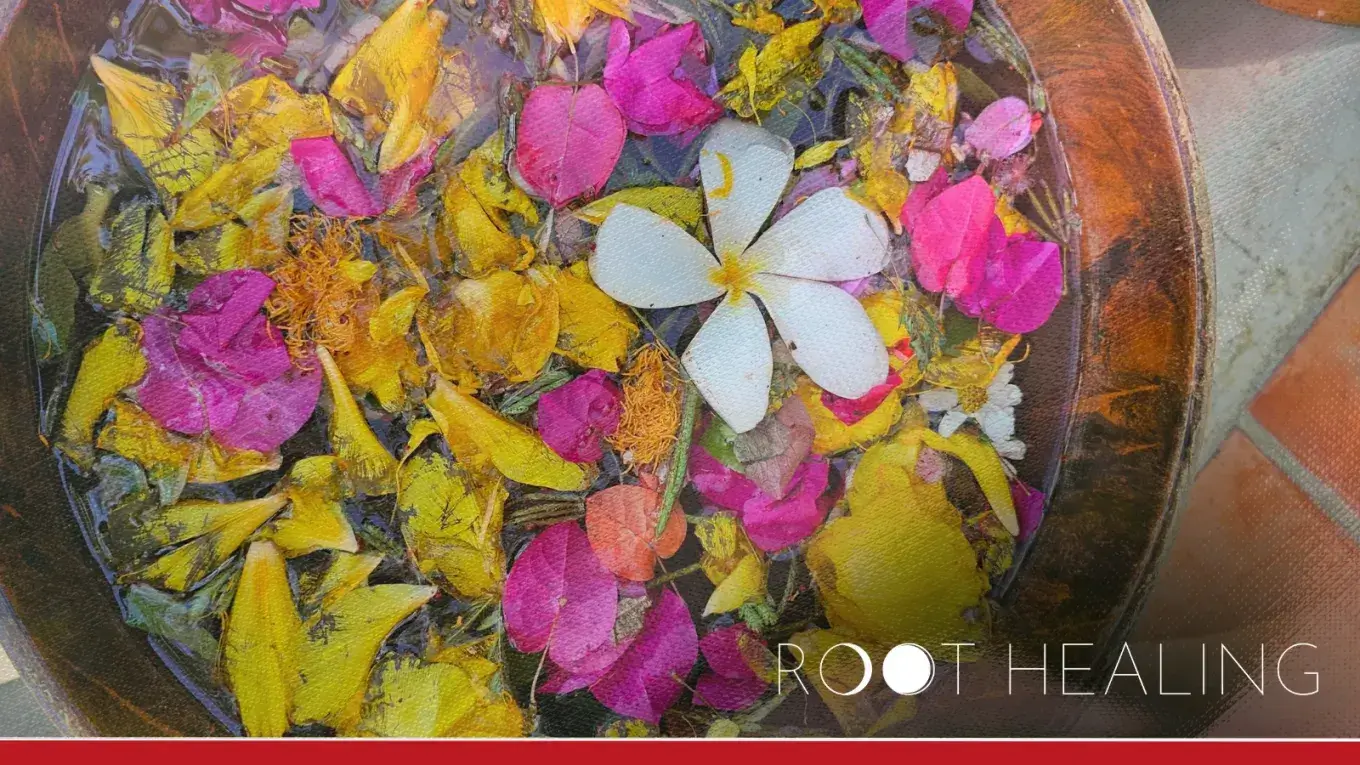What do the Bwiti tradition and Valentine’s Day have in common?
At first glance, not a lot. Especially if you’re yet to start finding out about the Bwiti tradition, and the thought of Valentine’s Day fills you full of wistfulness; or worse, memories of tense silences in chain pizzerias. Or worse even than that — the painful self-reckoning that can set in when there’s no one to share the silence with.
While this is perhaps an inevitable part of the human experience, it points to questions about how we can change our relationship with relationships, and with love itself.
And for us at Root Healing, that’s where Bwiti iboga comes in…
Iboga: something for you, not for two
If you have started learning about the Bwiti tradition and iboga, you might already be aware of the saying: “there’s no iboga without Bwiti, and no Bwiti without iboga.”
The form of Bwiti we practice at Root Healing retreats is called Missoko Bwiti — one of the oldest branches and the one which is dedicated to healing. Those who follow this path are known in Bwiti as “Students of Life.” At its core, the Bwiti tradition as it underpins the iboga ceremonies we provide is about how to live — and this means getting back in touch with yourself.
Embarking on a Bwiti iboga experience is as much about healing as it is about self-discovery. While many people start looking into iboga — due to its profound anti-addictive properties — on behalf of loved ones, the decision to book an iboga retreat needs to be one hundred percent yours. (Even though its ripple effects are likely to be felt by the people you love!)
If you do book a retreat, you’ll quickly realize how important alone time is; a key feature of the iboga experience — when you’re preparing, when you’re in ceremony, when you’re processing and integrating the retreat.
Whether you join us for a detox or a psychospiritual retreat, it’s always a you-focussed adventure — as the Bwiti tradition combines with the medicine to help you get to know you.
Know yourself; love yourself — what to expect from iboga
Self-love can all too easily be conceptualized as self-ish and likened to self-obsession.
And in a very reasonable attempt to avoid being self-obsessed or selfish, it is all too easy to go through life without taking the time to fully tend to ourselves, neglecting to practice self-love while you keep your focus on the wellbeing of those around you.
An unfortunate and often unseen as well as unforeseeable consequence of this is that your self — your true essence — can all too easily get lost; forgotten within your day-to-day consciousness and buried under the coping strategies you naturally adopt as you go through life.
Especially where these coping strategies involve substances, the ways you live and how these feed your head can keep taking you further and further away from the self you were born with.
Even if you have happy, calm memories of a time before the stresses and pressures of daily life built up around you, it can seem as though it’s impossible to access these feelings or the sense of yourself that comes with the memories. But that doesn’t mean it’s not there.
The iboga experience can bring you into reunion with the most authentic parts of yourself. This makes it possible to review all your choices, circumstances and intentions for the future, reorientate your life path and redesign your life — on processing and integration days, within our aftercare programme and beyond — to nourish the true version of you.
Intentions set and choices made from this standpoint are acts of self-love.
Improve your relationship with yourself — and all your relationships
After iboga, our guests tend to find that the way they relate to others changes once they’re in a loving relationship with themselves. This doesn’t just apply to romantic love, but to your relationships with other loved ones — your children, parents, siblings and friends — as well as the other interpersonal relationships that make up the fabric of your life, like your co-workers.
A key reason for this is that once iboga has reunited you with your true essence, this changes the kinds of choices you are likely to make, as well as the decision-making processes that go into them. You will find that there’s a space between your enactment of habitual, people-pleasing tendencies — you’ll be able to notice your inclination towards old behaviors that tie you into old patterns, and step beyond their snares.
With your old attachment patterns behind you — and when you are operating from a place of self-love — it will be easier to build healthy boundaries into both existing and new relationships. The kinds of shifts you’ll make in the light of your iboga experience shouldn’t spell the end of relationships that genuinely support you. However, your self-knowledge may result in newly self-protective choices that mean ties to people that don’t have your best interests at heart naturally fall away.
Some Bwiti do celebrate Valentine’s Day; the Bwiti love to celebrate. But there’s not such a need to when the tradition — which has been practiced the same way for millennia in exactly the same way we share it on our iboga retreats — directly engenders a life-shift that makes every day a heartfelt celebration of what it means to be you.
